 Abengoa
Abengoa
Annual Report 2013
- Activities
- Activities
- Infrastructures under concession
Abengoa boasts an impressive portfolio of proprietary assets under concession, all generating income through long-term sales agreements, guaranteed purchase agreements (take or pay) and power purchase agreements.
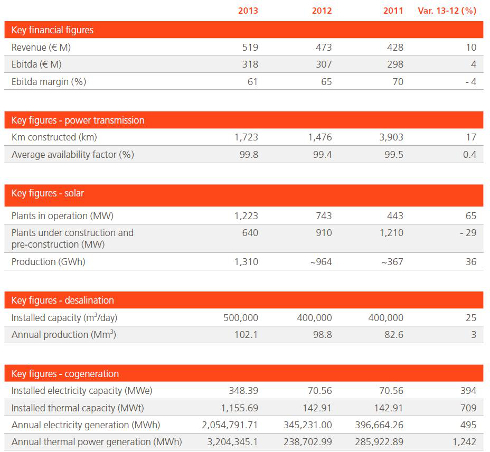
* CHP figures have significantly increased mainly due to the new 300 MW Mexico facility.
Transmission lines business
Transmission lines permit efficient and sustainable transport of electricity. Transmission assets are an essential part of the power infrastructure, significantly more so taking into account various factors such as spiraling electricity consumption, the widening gap between generation facilities and consumers, the ever-increasing weight of renewable sources on electricity markets and the growth of emerging countries.
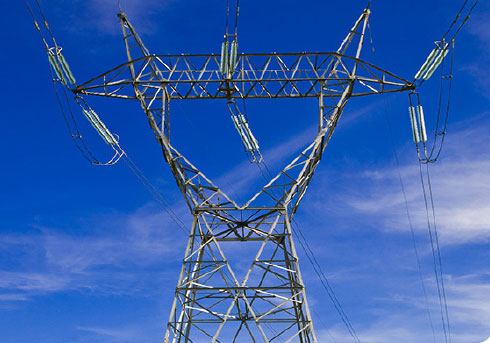
Abengoa is operating and constructing more than 11,000 km in transmission line concessions, double the 2012 figure. The company is one of the leading private concessionaires in Latin America with assets in Peru, Chile and, above all, Brazil, where it secured four new major transmission projects this year, amounting to almost 3,200 km.
Large-scale transmission and distribution systems are one of Abengoa’s business strategies. The company is the sector’s undisputed market leader worldwide, with a big advantage over its competitors. As the company is vertically integrated and boasts an undisputed track record in transmission line engineering and construction, it is fully capable of tapping into the huge opportunities currently emerging worldwide in the area of transmission concessions, with this concession model becoming ever more frequent.
The company has unique capabilities for the management of its own assets under concession. It covers the entire value chain, from promotion, financing, design and engineering, to the supply of equipment, manufacture of metal structures, construction, establishment, operation and maintenance of systems.
These unique capabilities allow the company to transport power, not only to big cities and industrial hubs, but also to remote locations and under extreme conditions. The company faces the future challenge of assuming the concession of Brazil’s highest direct current transmission line, and a transmission line in Peru that will reach a height of up to 3,000 m above sea level. Both projects are currently under construction.
Abengoa has set up various corporate social responsibility projects related to concessions to benefit the communities in the vicinity of the transmission line concessions and to protect the environment.
Brazil
Abengoa continues to grow in this country’s power transmission market. The following lines were brought into operation in 2013:
- Manaus, 500 kV and 586 km, connecting the municipalities of Oriximiná-Silves-Lechuga. Located in northern Brazil, it is one of the first power transmission lines to cross the Amazon. The towers used in this project are some of the tallest in Brazil, at 190 m. This transmission line supplies electricity to the city of Manaus, with a population of 1.9 M.
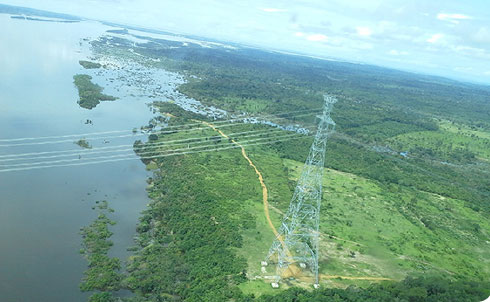
- Itacayunas-Carajás (ATE VIII), 130 km and 230 kV. Located in the state of Pará in northern Brazil, it supplies the 150,000 inhabitants of Parauapebas. The transmission line provides greater reliability to local industries, in a region with some of the highest levels of mining activity in Brazil. Abengoa has a 30-year concession.
In addition, the company has been operating the following transmission lines and 230 kV electrical substations in southern Brazil for Aneel, since 2009. These transmission lines have contributed toward the increased reliability of the region’s electricity system. Abengoa has a 30-year concession for operation and maintenance of these transmission lines.
- Curitiba – Bateias (ATE IV), 85 km, supplying the 3.3 M population of Grande Curitiba.
- Londrina – Maringá (ATE V), 140 km, benefiting some 900,000 people.
- Campos Novos – Videira (ATE VI), 131 km, supplying electricity to 50,000 inhabitants of Videira.
- Foz do Iguaçu Norte-Cascavel Oeste (ATE VII), 115 km, located in southern Brazil on the border with Argentina and Paraguay. It supplies electricity to 260,000 inhabitants of the famed city of Foz do Iguaçu.
Peru
- Having completed the engineering and construction works, Abengoa began operating the 872 km and 500 kV Chilca-Marcona-Ocoña-Montalvo (ATS) transmission line, which included the construction of three electrical substations. The concession includes operation and maintenance for a 30-year term. This transmission line, together with the one located in La Libertad, will permit the connection of almost the entire coast of Peru, stretching some 1,600 km, thus contributing to the development of this region of Peru.
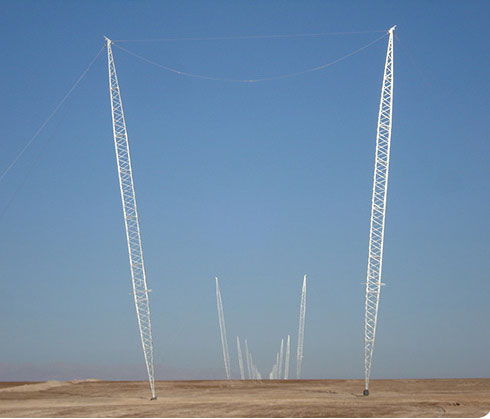
- Operation of the 572 km and 220 kV high-voltage Carhuamayo–Cajamarca and Cerro Corona-Carhuaquero (ATN) transmission line and two new electrical substations and extensions to five existing electrical substations, is ongoing. Abengoa has a 30-year operation and maintenance contract.
Chile
- Having completed the engineering and construction phase, Abengoa began the operation of two transmission lines, 50 and 79 km respectively, for Minera Quadra to supply power to the Sierra Gorda mine, crossing the Atacama Desert in northern Chile from north to south. Abengoa will operate this transmission line for 20 years.
- Operation of the 10 km transmission line in Palmucho, for which Abengoa has a 10-year plus concession, is ongoing.
New concessions under construction
- In Brazil, the company will operate the concession of seven major electricity transmission projects, totaling 5,800 km in length. The transmission lines will pass through the municipalities of Pernambuco, Ceará, Maranhao, Pará, Tocantins, Río Grande do Nort, Minas Gerais and Sao Paulo, among others.
- The construction is ongoing of one of the world’s largest power lines, spanning 2,412 km. It is located between the cities of Porto Velho and Araraquara. Abengoa will also operate the concession of the assets.
- In Peru, the company will operate the 354-km and 220-kV transmission line between Machupicchu and Tintaya. Also in Peru, Abengoa will operate the 18-year concession of the 130-Km and 220-kV Las Bambas-Cotaruse transmission line.
Solar Business
Abengoa has secured its position of global leadership in the field of solar infrastructures under concession through the construction and bringing into operation of new plants, its ever-increasing participation in new markets worldwide and the promotion of new projects with innovative technologies never before commercially implemented.
Abengoa has global presence, distributing its solar business in the following countries:
- Europe: Spain and Italy
- America: The United States, Mexico, Brazil and Chile
- Africa: The main countries of North Africa and South Africa
- Asia: The Middle East, India and China
- Oceania: Australia
In the field of solar technology, 2013 ended with significant growth in geographical diversification of Abengoa’s solar business thanks to commencement of operation of solar thermal plants such as Solana and Shams-1 in such diverse locations as the Arizona desert in the United States and the Abu Dhabi desert in the United Arab Emirates, respectively. Sustainability of this growth is ensured thanks to next year’s completion of projects of paramount importance, including the 280 MW Mojave Solar parabolic trough plant in California. This significant growth has served to drive the continued opening of new markets, as evidenced by this year’s concession of a 110 MW plant in Israel.
Abengoa’s solar infrastructure concessions are divided into the following lines of activity:
- Promotion of solar and hybrid power plants:
This line of activity consists of prospecting ideal locations for solar plants, carrying out the necessary administrative formalities to begin construction, negotiating project financing and construction agreements and identifying potential partners and reaching agreements with them. All these activities are carried out for solar plants that generate electricity, for hybrid plants that harness sunlight along with a conventional energy source and for industrial plants that generate heat for commercial and industrial uses.
- Commercial operation of solar and hybrid power plants:
The solar power plants developed by Abengoa sell their electricity under long-term concession agreements. Optimal operation of Abengoa’s plants is key to securing and increasing the projected returns and its experience in carrying out these crucial tasks enables it to make technological improvements. Moreover, thanks to the sheer number of commercial plants in operation, Abengoa is able to harness synergies between the different facilities, thus improving their operational efficiency.
Promotion of solar power plants
Important milestones were reached throughout 2013 in the promotion of plants, serving to secure the company’s position. Among the year’s achievements it is fitting to highlight the commencement of operation of Solana, the world’s largest plant using parabolic trough technology with 280 MW, which is also equipped with a molten salt thermal energy storage system, one if its kind in the United States, to permit production after sunset or during cloudy spells. This year, Abengoa added Liberty Interactive Corporation as an investor in the limited company that manages the plant, with an investment of $300 M. Abengoa is still in charge of management, operation and maintenance. Solana has taken an important step to consolidate its position and gain the trust of the US market in Abengoa, in addition to its technological progress in the manageability of solar power.
Abengoa also completed two major projects this year, with the financing and establishment of two new parabolic trough plants in Spain with an installed capacity of 50 MW each. These two new plants, together with another two with the same characteristics already up and running, make the Extremadura solar platform Europe’s biggest solar facility. Also, operations have begun at Shams-1, the first parabolic trough plant in the Middle East.
In addition, Abengoa has signed a long-term power supply agreement with Israel for a 110 MW parabolic trough plant together with a local partner, namely Shikun & Binui, a global company in the infrastructure and construction sector. The company has also increased its project portfolio in South Africa where it was awarded the contract for a new 100-MW parabolic trough plant with five hours storage, namely Xina Solar One.
The completion of these projects and the endorsement of other previously mentioned innovative projects have made this an unparalleled year for the positioning of Abengoa in new markets, thus securing the company’s continued medium and long-term growth.
Operation of plants
The operation of plants that Abengoa developed in previous years is, without doubt, the driving force behind the company’s exponential growth this year. The operation of 23 plants using both solar thermal and photovoltaic technologies with a total installed capacity of 1.2 GW has permitted Abengoa to gain valuable experience in plant operation and maintenance. This know-how is becoming one of our main lines of business given that Abengoa is one of the most experienced companies in the operation of plants of the entire solar power sector. It is without doubt the foundation on which all growth of the company’s solar business is built, and is a solid foundation to achieve the goals set for the coming years.
Solana
Solana began operating in 2013, gaining the status of the world’s largest parabolic trough plant with an installed capacity of 280 MW. The power generated at this plant is sold through a 30-year sale-purchase agreement signed by Abengoa with Arizona Public Service (APS), Arizona´s largest electric utility.
Located some 100 km southwest of Phoenix, Arizona, this plant has a solar field with 32,000 collectors and a six-hour molten salt thermal energy storage system, the only one of its kind in the United States. This system permits the generation and distribution of electricity during cloudy spells and after sunset, meeting the peak demand for electricity.
From an environmental perspective, Solana offers clean, contamination and greenhouse gas-free energy, equal to the energy demand of 70,000 homes, curbing annual CO2 emissions by almost 500,000 t.
Solucar Complex
The Solucar Complex features a series of plants dedicated to commercial operation and technological innovation. The complex boasts the world’s first two commercially operated towers, three parabolic trough and two photovoltaic plants, as well as numerous research, development and innovation facilities, including two pilot tower plants, all of which were constructed and operate independently. In 2013, PS10 celebrated six years in commercial operation, and PS20 four years, surpassing the first year’s operation of the complex’s four towers combined.
The experience gained through operation and maintenance of the seven commercial plants at the Solucar Complex makes Abengoa a leader in solar plant management. Moreover, the first molten salt solar tower has achieved extremely high levels of efficiency, making this technology commercially available in situations where it is necessary to offer clean solutions with very long storage periods.
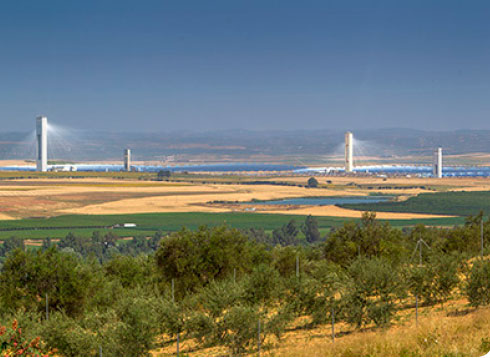
Extremadura Solar Complex
In 2013, commercial operations began at Solaben 1 and Solaben 6, two of the four independently constructed and operated 50 MW parabolic trough plants that make up the Extremadura Solar Complex. The commencement of operation of both these plants makes this facility the largest solar complex in Europe and one of the largest in the world, with a total production of clean energy meeting the supply needs of some 105,000 homes and curbing annual CO2 emissions by approximately
126,000 t.
Abengoa has a 70 % stake in the Solaben 2 and Solaben 3 plants, while ITOCHU, a global Japanese company, controls the remaining 30 % of these two plants. Abengoa has a 100 % ownership stake in Solaben 1 and Solaben 6.
The construction and operation of the solar complex has created important socio-economic benefits for the region. Its construction required an average of 400 workers per day, and at times up to 1,000. The economic activity generated around the solar complex has also led to growth of the region’s business network, while boosting the services sector.
Ecija Solar Complex
This complex has two 50 MW parabolic trough plants. The independently constructed and operated Helioenergy 1 and Helioenergy 2 plants are jointly operated by Abengoa´s solar business and E.ON.
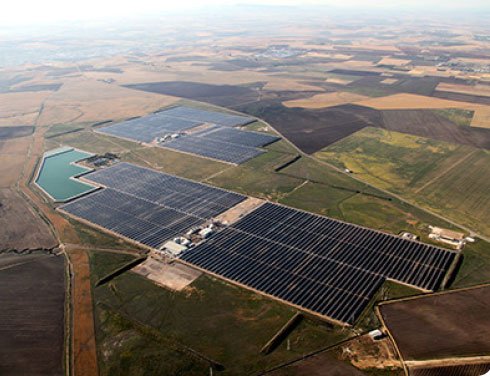
Castilla-La Mancha Solar Complex
The complex, located between the municipalities of Arenas de San Juan, Villarta de San Juan and Puerto Lápice in the province of Ciudad Real, has two identical 50 MW parabolic trough plants, each independently constructed and operated.
El Carpio Solar Complex
The complex has a total of 121,000 mirrors that concentrate sunlight to generate steam at temperatures of up to 400º C.
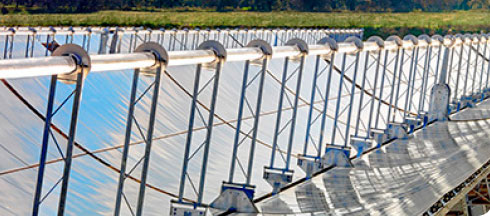
The facility consists of two independently constructed and operated parabolic trough plants. Both plants are jointly owned by Abengoa and the Japanese conglomerate JGC. Abengoa operates both plants and has a 74 % stake.
Shams-1
Shams-1, the first solar thermal plant in the Middle East, with 100 MW capacity, represents the final step to position Abengoa in a region with enormous potential in the solar power sector. This parabolic trough plant became operational in 2013, with an installed capacity equal to the energy demand of 20,000 homes. Abengoa has a 20% ownership of this plant.
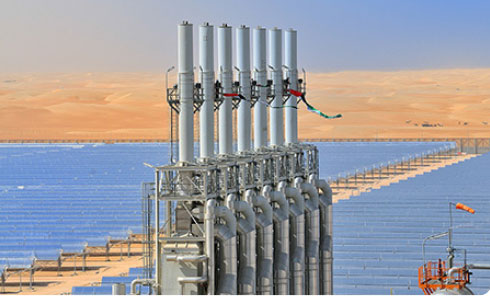
Hassi R’Mel
The hybrid integrated solar combined cycle plant operated by Abengoa in Hassi R’Mel, Algeria, continues to satisfactorily meet the operational objectives. This plant has 150 MW capacity, of which 20 MW come from a field of parabolic trough collectors. It is one of the first plants of its kind to be constructed in the world, making Abengoa a pioneering company in the construction and operation of solar plants in North Africa. Abengoa shares ownership of this plant with a strategic partner, namely NEAL (New Energy Algeria).
The hybridization of solar thermal combined cycle plants is an extremely interesting solution at locations with abundant sunlight and low gas prices.
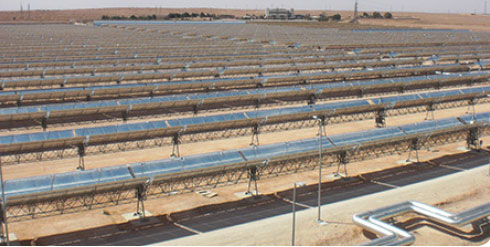
New concessions under construction
In 2014, operations are expected to get underway at the Mojave and Khi Solar One plants, in California, USA, and South Africa, respectively; both of which will form part of Abengoa’s concession-based business, being yet another example of the company’s drive toward the diversification and internationalization of its business.
In the coming years, it will continue with the expansion of its concession-based business in the international arena.
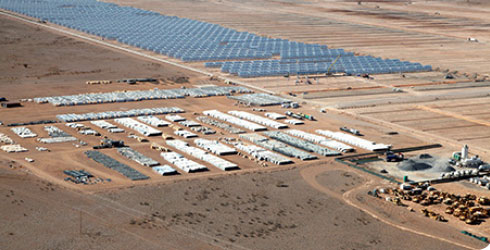
Desalination business
Desalination is the process of removing salt and other minerals from water. Desalination is one of the most rapidly growing solutions to water shortages. This growth reflects the fact that much of the growing demand for water comes from coastal regions and the sharp drop in costs of this technology over the last decade. The installed global capacity for desalination in 2012 (industrial and municipal) was 75 million m³/day, with a market value of $3,938.3 M. Growth in this market is expected to reach $15,188.4 M by 2018. In particular, the annual growth rate of capital investment in seawater desalination is expected to reach around 19.2 %. The following are predicted to become the main desalination markets in the coming years, in order of size: The United States, Saudi Arabia, the United Arab Emirates, Kuwait, China and India.
Our mission is to promote, develop and operate water treatment plants, with innovation and technological development as the drivers of growth.
Abengoa’s vision is to consolidate its position as the international market leader in desalination plants, managing proprietary assets while expanding its water treatment and reuse business, including water treatment in the industrial sector.
The desalination division divides its lines of business into:
- Concessions
- Services
- Processes and systems
- Technology
Projects by territory
Desalination plants under concession:
Algeria
- Skikda: The purpose of this desalination plant is to produce drinking water from seawater to supply the city of Skikda, a Mediterranean coastal port located 80 km west of Annaba, Algeria. It is the first project developed under the concession scheme in Algeria. The plant supplies a population of 500,000. It has a capacity of 100,000 m3/day and has been operating since 2009.
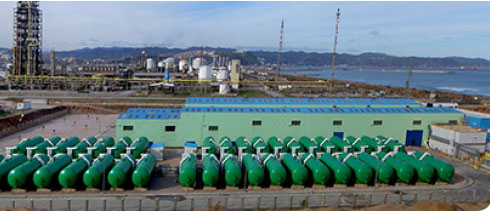
- Honaine: The purpose of this desalination plant is to produce drinking water from seawater to supply the city of Honaine, Tlemcen. The plant supplies a population of almost one million. It has a capacity of 200,000 m3/day and has been operating since 2011.
India
- Chennai: The purpose of this desalination plant is to produce drinking water from seawater to supply the city of Chennai located in the state of Tamil Nadu in India. It has a capacity of 100,000 m3/day and has been operating since 2010.
China
- Qingdao: The purpose of this desalination plant is to produce drinking water from seawater for industrial use and human consumption in the city of Qingdao. It has a capacity of 100,000 m3/day and has been operating since 2013.
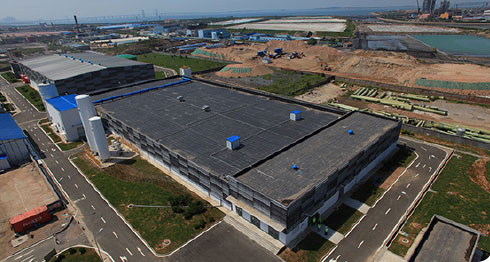
New concessions under construction
Construction of the Ténès desalination plant in Algeria is ongoing, which will supply half a million inhabitants and have a capacity of 200,000 m3/day.
Construction is underway of a desalination plant in Ghana, with a capacity of 60,000 m3/day, which will supply drinking water to localities in the metropolitan area of Accra, Theshie, Nungua and Tema.
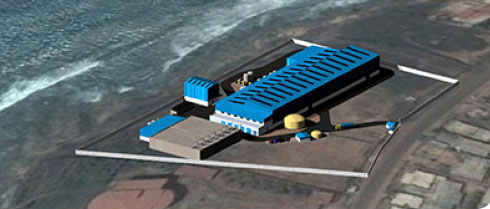
Other concession activities
This section looks at Abengoa’s concession activities in electric and thermal energy (cogeneration), mini hydro plants, specific buildings and other non-standard concessions.
- Cogeneration: cogeneration generates electricity and high-temperature heat simultaneously. Its main advantage over other generation systems is its greater energy efficiency, making use of both heat and mechanical or electric energy in just one process, as opposed to using a conventional electric plant and boiler. In addition, it permits the generation of electricity close to the point of consumption, thus preventing voltage fluctuations and long-distance transmission, which tends to result in a loss of energy.
- Mini hydro plants and other infrastructures: this section looks at the operation of some small hydroelectric plants and the concession of an irrigation zone in Navarra (Spain).
- Specific buildings: this covers the operation of a variety of properties such as hospitals, courthouses and cultural centers.
Spain
- Cogeneración Villaricos in the province of Almeria, and Aprovechamientos Energéticos Furesa in Murcia. Both these cogeneration plants specialize in the generation of electricity and the use of heat to produce water or steam. The electricity is then sold, while the heat is used by the host industry.
- Abengoa operates the concession of the irrigation zone of the Navarra canal, levying an irrigation charge for this activity.
- For over 10 years, Abengoa has managed the Cerrato hydroelectric power station on the Pisuerga river and the mini plants on the Aragon and Catalonia Canal.
- Abengoa has a 30-year concession for Hospital del Tajo, covering 58,000 m².
- The company owns the surface rights for construction, maintenance and operation, through a lease to the Autonomous Government of Catalonia, of the courthouses at Olot, Cerdanyola and Santa Coloma de Gramanet.
Mexico
- Commencement of operation of the largest cogeneration plant in Mexico, with 300 MW, located at the facilities of the state-owned company Petróleos Mexicanos (Pemex) in Tabasco. Comprising two gas turbo generators with their respective electric generators and two heat recovery steam generators, it generates up to 800 t/h of steam to supply electricity to the Nuevo Pemex gas processing complex, feeding surplus power to the Mexican power grid. Abengoa will undertake operation and maintenance of this plant for 20 years.
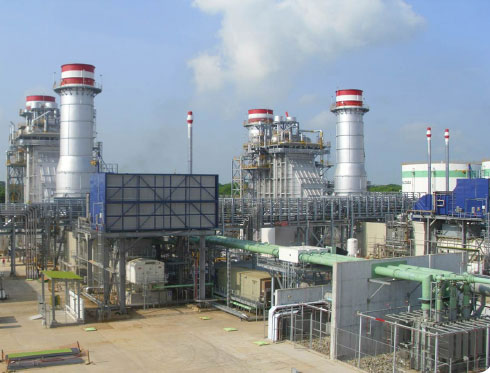
- Abengoa continues with the concession of the Centro Cultural Mexiquense de Oriente (CCMO); the company’s first project of the “specific building” category in Mexico. The complex, with an operational term of 20 years, sits on 17 ha of land and boasts 35,000 m² of museums, libraries and workshop modules with over 60 classrooms, an administrative building, auditoriums, an open-air theater, a concert hall with seating for 1,200 people, cafeteria, restaurant and parking spaces for over 1,000 vehicles.
New concessions under construction
Abengoa is working on different projects under concession:
- In Mexico, Abengoa will operate the 25-year concession of the El Zapotillo aqueduct, in the construction phase, for the National Water Board (Conagua).
- In Uruguay, Abengoa is building three wind farms for the state electric utility (UTE) that will operate for 20 years, with capacities of 50 MW (in Cuchilla de Peralta, Tacuarembó), 50 MW (in the outskirts of Trinidad, Flores) and 70 MW.
- In Brazil, Abengoa will operate the 18-year concession of the future Hospital of the northern zone of Manaos, of 30,000 m2.
- In Spain, Abengoa will operate the 40-year concession of the Costa del Sol Hospital located in Malaga. The company will be in charge of operating the 31,000-m2 hospital area and managing the 25,000-m2 parking lot (960 spaces).
Aerial view of the Manaus transmission line in the Amazon.
ATS transmission line in Peru.
Solucar complex.
Aerial view of Helioenergy 1 and Helioenergy 2, two 50-MW parabolic trough plants.
50-MW parabolic trough collectors of Solacor 1. In the background, a view of the municipality of El Carpio (Cordoba).
View of Shams-1. First solar thermal plant in the Middle East, with 100 MW of power.
Hassi R’Mel, the 150-MW integrated solar combined cycle (ISCC) plant with parabolic trough solar field is located in Algeria.
View of KaXu Solar One. One of the first two solar thermal plants in South Africa, with parabolic trough technology and a capacity of 100 MW and 2.5 hours of thermal storage, located near Pofadder (Northern Cape).
Desalination plant in Skikda (Algeria) with a capacity of 100,000 m3/day, in operation since 2009.
Desalination plant in Qingdao, with a capacity of 100,000 m3/day, in operation since 2013.
The desalination plant under construction in Accra (Ghana) will have a capacity of 60,000 m3/day.
With the construction now having been completed, Abengoa will operate the plant for 20 years.
© 2013 Abengoa. All rights reserved
